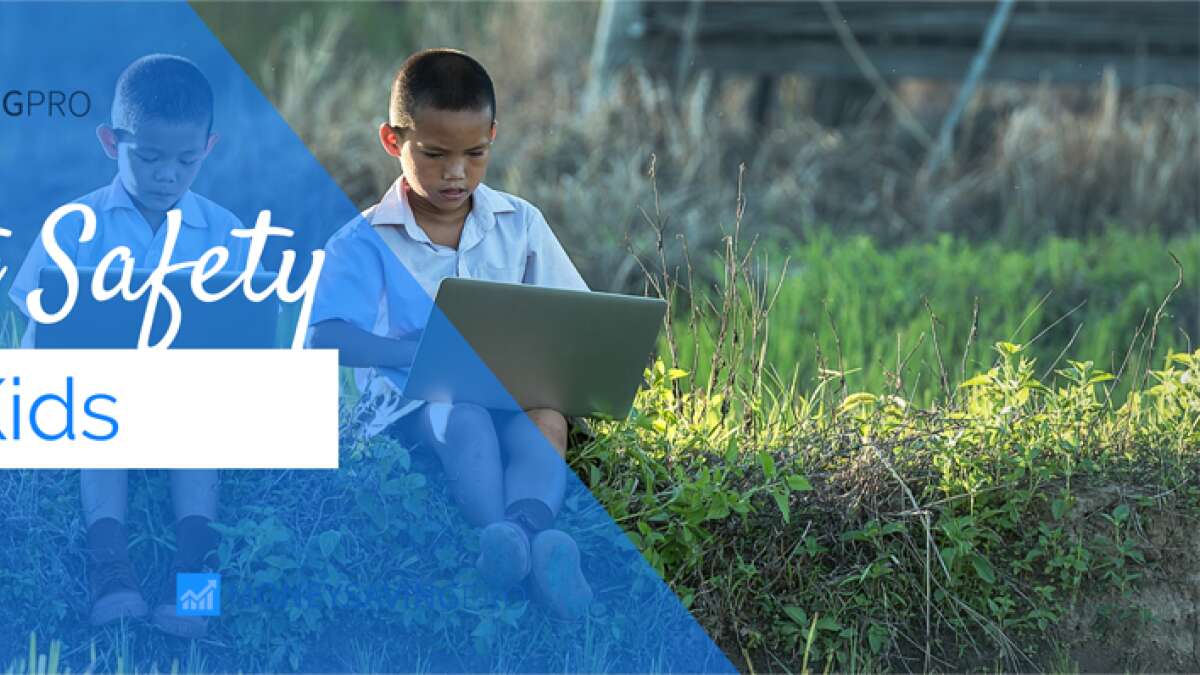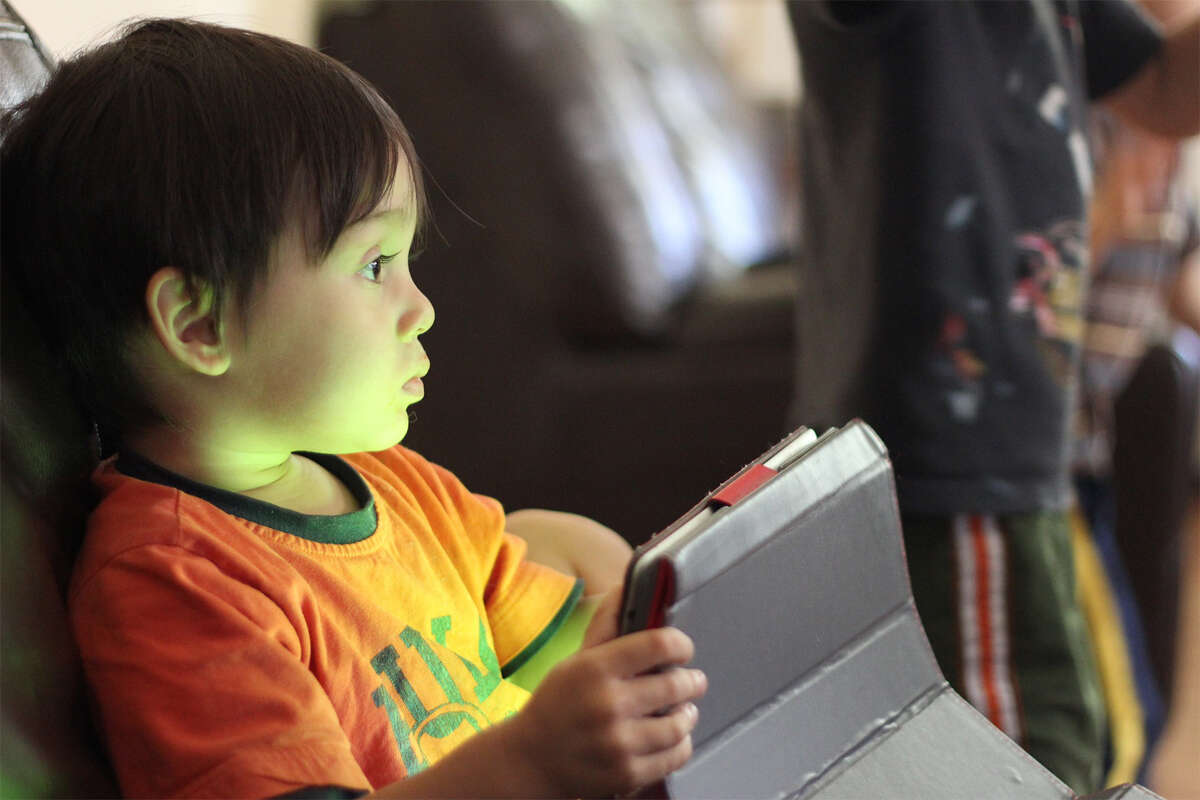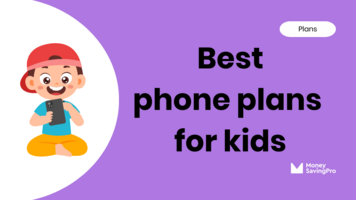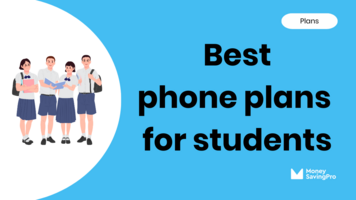Internet Safety for Kids
How to teach your kids about internet safety

MoneySavingPro independently researches the products & services to bring you our recommendations. We may earn money when you click our links - disclosure policy.
It's official - the internet is now a utility, like water and electricity, not a luxury. It opens up a world full of staggering opportunities.
It's also clear that kids are receiving their first internet-capable device at a younger and younger age every year.
So how do we keep our children safe from the dangers lurking in the shadowy corners of cyberspace?
Don't worry, help is on the way: I'm going to share with you the most important things for parents, teachers, counselors, and authority figures to do to keep children safe online.
Threats to our Kids from the Internet
In most ways, the internet is a miracle of modern technology. Our kids are exposed to culture and concepts outside of their communities and country. They learn things and see others' real lives in action in ways we never even dreamed of when we were younger.
With global exposure, however, comes the opportunity for those with less than honest intentions to prey on the most vulnerable.
One of the worst mistakes you can make is assuming that your child isn't being cyber bullied simply because you don't hear about it at the dinner table.
1. Online Predators
This is probably the threat that strikes the most fear into parents' hearts. The thought of a stranger luring our innocent kids right out of their homes and into a situation where sexual abuse is the most common result sends chills up our spines. The fact is, however, that it happens, and awareness is the best way to keep your child safe from those with ill intentions.
According to the U.S. Department of Justice's facts and statistics on "Raising Awareness About Sexual Abuse":
- 13% of youths with internet access have been victims of unwanted sexual advances.
- 1 in 25 kids has been solicited for offline contact.
- 47% of internet sex crimes involve offerings of gifts or money during the "grooming" phase (the period of time during which the predator establishes an emotional connection with the child, preying on their curiosity and naivete).
- 76% of online encounters with sexual predators begin in online chat rooms. The contact can initiate anywhere, however - via social media, email, text message, and more, depending upon how the predator obtains the child's information.
Later in this guide, I'll outline how you can prevent such encounters, as well as how to prepare your kids to respond appropriately if it happens to them.
2. Cyberbullying
Sex crimes aren't the only way your children can be impacted by contact with others online. Over the past 20 years, cyberbullying has moved into the public spotlight due to a number of teen suicides resulting from online harassment.

This form of online stalking may include:
- Threatening messages via email, text message, or social media websites
- Posing as another child and posting in their stead
- Taking and posting or forwarding suggestive photos
- Spreading rumors via text message or social media
One of the worst mistakes you can make is assuming that your child isn't being cyberbullied simply because you don't hear about it at the dinner table. According to internet safety education foundation i-SAFE, fewer than half of cyberbullying victims tell a parent or adult that they're being harassed. For more information, read our cyberbullying ultimate guide.
Pro Tip: The Justice Department also provides extensive cybercrime prevention information including how to deal with cyberbullying.
3. Identity Theft
Physical and emotional harm are major concerns for us as parents when it comes to online safety. However, kids can also be vulnerable to those who wish to steal information for financial purposes. Here are just a few ways your information can be compromised:
- Free downloadable games: these are available through mobile apps as well as on the World Wide Web. Disreputable sites that lure children in with free downloadable games can embed your computer with viruses which can steal private information.
- Online phishing scams: these typically arrive via email, often under the guise of a familiar company's name. Online phishing scams are just one of the many reasons to block spam with your email's spam filtering program.
- File sharing programs: aside from some of them being unethical, file sharing programs can also expose your computer or mobile device to unsavory activity.
Identity theft, in particular, is emerging as a significant threat to minors. Data shows that as many as 10% of children are victims of having their social security number used by someone else.
Kids are trusting. That means they may not think anything of sharing details like their last name or hometown, on social media sites or through text message. If someone gains their trust, your child may even inadvertently share information which could compromise your credit cards or other financial records. That's why it's important that we don't just monitor what our kids are looking at online but also have a conversation with them about how to use the best internet safety tips.
If you're especially concerned about your child's information staying safe, you may consider investing in we offer comprehensive information, encrypts all information you or your child enter into websites, providing an additional layer of protection against hacking. In addition to safeguarding your child's privacy, a VPN is a useful tool for allowing you and your kids to access streaming service such as Netflix when abroad.
You may also want to look into the top identity theft protection services. There are even plans available for kids, which can help head off a problem before it even begins.
4. Pornography
I'm not sure there are many of us who didn't sneak a peek at a (contraband) Playboy now and again as adolescents. As risque as that may have been, it seems tame compared to the glut of pornography of all kinds available to our own children at the click of a mouse.
Not only do these images steal our kids' innocence, the average age at which children are exposed sits at an incredibly young 11 years (according to the Center for Parent/Youth Understanding).
In addition to the fact that young children simply aren't ready for sexually explicit imagery at such a tender age, there's an extremely vast disconnect between the girly mags of yesteryear and the graphic - and often disturbing - content available on the internet.
Negative effects of pornography exposure at a young age include:
- Confusion and fear
- Guilt and shame due to natural physiological reactions
- Desensitization to inappropriate and often demeaning content
Experts say it's not a matter of if children will see this type of content, it's a matter of when. In fact, This makes it all the more important to prepare them and make sure they don't feel uncomfortable talking to you in the case of an accidental incident.
Internet Safety for Young Children
Children are using computers and mobile devices younger and younger, often from toddlerhood. This fact opens up a big can of worms regarding the internet and kids' safety while online.
There are things you can do to protect your young children from viewing inappropriate content, and these measures will vary based on their age and online activities.

Internet Safety for Kids Under 5
There are so many fun and educational online activities available for the pre-K crowd, and fortunately, this may be the easiest age group to keep safe while they enjoy their games and websites. They're old enough to work a mouse but typically too young to get into too much trouble, particularly since we as parents tend to be supervised closely at this age.
Here are some tools you can use to make sure your preschooler sticks to what they're supposed to be doing online:
- Whitelists: A whitelist is one of the easiest ways to keep your little on track while they use the computer. Most browsers include this feature, typically in the form of an extension. All you do is add the sites your child is permitted to use, bookmark them, and instruct your child on where to find the list. All other websites will be blocked should your child click on something he's not supposed to. Best of all, whitelisting is free.
- Parental control software: Internet filtering software, such as Net Nanny allows you to filter inappropriate content, block profanity, set time limits, and receive alerts and notifications about your child's online activity. These programs offer great flexibility and customizable control, however, they aren't free. Net Nanny, for example, costs $40 per year for one device.
- Free internet filtering software: There are some free internet filtering programs, like K9. You can also use the free Internet Explorer parental controls. The protection provided by Internet Explorer parental controls and other safe browser features is only effective on one computer. That means you'll have to adjust the settings on each device your child uses.
- Computer security software: Big names in cybersecurity, such as Norton also make computer security software to help keep your kids safe online. Choose from free versions, or more feature-rich paid versions.
- Educational tools: Kids can get an early start on internet safety with content like the Webonauts Internet Academy on the PBS Kids website. The Webonauts Internet Academy uses games to teach kids about appropriate online behavior and how to stay safe in cyberspace.
For very young children, the most important tool for internet safety is simply parental awareness and supervision. Limit the number of websites your child can play on to no more than a few and keep the computer out in a central location in the house.
Read More: Learn how to set up parental control settings.
Internet Safety for Elementary Kids
As children move past the stage of being satisfied playing on Nick Jr. and the PBS Kids website, things get a bit more complicated. This is the age at which you want to start to talk to them about putting these online safety tips into action.
Using tools like those I listed above for younger kids is still appropriate, however, you will want, to begin with a dialogue about safe browsing habits.
Social media websites like Facebook and Twitter can open up a whole new world of risk, between cyber bullying and exposure of personal information to strangers.
Social Media Safety
If you have older elementary-aged children, this is also the age at which you can expect a lot of pressure to allow your son or daughter to participate in social media. Social media websites like Facebook and Twitter can open up a whole new world of risk, between cyberbullying and exposure of personal information to strangers. Social media safety has become a topic of great debate due to age requirements for signing up for social media sites.
I personally chose not to allow my kids to sign up for social media sites until they could do so without having to lie about their ages. Here's a shocker for you: not only are millions of Facebook users under the required age of 13 but that 68% had their parents help to create their accounts, according to data reported by Forbes.

Certainly, the decision to allow your elementary-aged child to use social media is a personal one which should be discussed within the dynamics of your own family. Your child's social media rules should follow the same pattern as your guidelines for general internet safety.
If you're concerned about what your kid is posting on Facebook or Snapchat, set up your own account and follow them. You can keep track and they will be more conscious in regards to what they post about. Do the same for every social media channel they use.
You should be transparent about this. Going behind their back will only cause resentment and leave them feeling more exposed.
You will want to make sure the lines of communication stay open, that the computer is in an open, accessible location, and that you are providing routine supervision.
Teaching Kids About Internet Safety
Regardless of which websites you approve for your child's use, you should make sure they understand and adhere to safe browsing habits.
Teach them to:
- Ask permission before visiting a new website.
- Never share personal information like name, address, school, photos, or family members' names. A quarter of all kids on Facebook never touch the privacy restrictions on their profile, and a fifth of them publicly display their address and/or phone number.
- Screen emails and don't open those from unknown sources. Their email program should have the ability to block spam.
- Be aware that people online aren't always who they say they are.
- Be nice to others online, just as they would in real life.
- Report to a parent or teacher if they encounter an uncomfortable situation or experience cyberbullying.
- Instruct them about browser best practices and how to surf the web privately.
- The Internet is great, but let your kids know when it is time to leave the computer screen. Here are 10 helpful tips for eliminating Internet addiction.
- Use a child-friendly search engine, such as KidsSearch.com.
It's also a good idea to turn on Google's Safe Search feature for your elementary school kids. Safe Search filters out inappropriate content, making the internet a bit safer for your kids, particularly when it comes to images.
Related: Hackers can attack anyone, but children are especially vulnerable. Our guide can help you and your child protect your devices from hackers.
Internet Safety for Teens
As kids get older, they're more likely to have a laptop or other connected device in their bedroom - which means they're surfing out of your sight. Keeping teenagers safe online will be much easier if you've already laid the groundwork by following the above guidelines from the time they first began using the internet. They already know many of the dangers.
The challenge now becomes getting them to use good judgment in the face of multiple temptations and opportunities to become the victim of threatening activity. Safe browser controls aren't enough at this age - teens need to play an active role in their own smart usage.
The internet doesn't have to be a scary place as long as you and your kids have a clear understanding of how to avoid potential pitfalls.
The most important piece of the internet safety puzzle is talking to your teens openly about potential issues they may encounter, and setting boundaries for their internet usage. Here are some general internet safety tips for your teenagers:
- Make sure they're using an email address that won't draw attention from predators. Anything suggestive in any way should be off limits.
- Encourage them to keep private information private. Have them use social media settings that prevent the general public from viewing their profile and photos, and instruct them to never post their phone number, address, or even the school they attend in a place where strangers could see it.
- Ask your teens about their internet activity. Showing interest in what they're doing on a daily basis helps to keep the lines of communication open.
- Discourage your teenager from posting their location to social media with apps that utilize GPS technology.
- Set firm rules about late-night internet usage.
- Stress to your teens that they can feel comfortable coming to you if they're being harassed online. Over half of youths have experienced cyberbullying in some form, and very few actually tell a parent. Have a plan in place for your teenager so that they understand you will help them if this occurs.
The internet doesn't have to be a scary place as long as you and your kids have a clear understanding of how to avoid potential pitfalls. Ultimately, you love them and want what's best for them, and they want and need to know that you care and will help them make good choices.
Mobile Device Safety
Mobile internet access makes up a large portion of online time for both children and adults. According to the Pew Research Center, 73% of teens between ages 13 and 17 use a smartphone. This means that it's imperative that child internet safety measures extend to their mobile devices.
Most of the online safety tips I've outlined so far in this guide apply to cell phone use as well. Beware: there is one significant added danger - sexting (which I will cover next).

In general, you should make sure your kids understand that the safety tips that keep them protected on their computers will also keep them safe on their mobile devices.
In addition to the common sense practices you've taught them, it's a good idea to set up a charging station in a central location in the house. This way their devices are not in their bedrooms, removing any potential for risky late-night online activity.
The Norton Family Premier app is not cheap at $49.99 but its got great features including location tracking, the ability to block individual apps and web filtering. Very usefully, it also works on multiple devices, should you have a family of smartphone users,
You can get more details on how to keep kids safe on their smartphones by checking out my ultimate guide to the best phone plans for kids.
Sexting
Anyone with a teenager has no doubt worried about their child participating in the practice known as "sexting". Activity can range from suggestive text messages being exchanged all the way to fully nude photos being sent and/or received. I'm including this topic under the general umbrella of child internet safety because so much of youth internet access happens on mobile devices, and sexting has become a major area of concern for parents of connected kids.
While you shouldn't panic and become overly controlling with your child's mobile device, you should definitely be aware and on the alert for any potential inappropriate texting activity. According to the Department of Justice's National Sex Offender Public Website, 26% of teenagers admit to participating in sexting.
If you can imagine your child with a group of three friends hanging out in your living room, one of them has taken part in this type of activity, and it could be your child. That's an alarming thought for any parent.
At the risk of sounding like a broken record, I will emphasize again how important open communication is for preventing and coping with this type of issue. When our kids feel like they can talk to us about anything, they will come to us if they receive - or are asked to send - a photo or message that makes them feel uncomfortable.
As with most other parenting challenges, prevention is the best cure. Here are some ways to handle the subject of sexting:
- Open a dialogue. Broach the topic and solicit your teen's opinion and thoughts on it. Avoid a lecturing tone - the idea here is to let them know that you're seeking a mutually respectful conversation in which you both can share what's on your mind.
- Talk about peer pressure. Teenagers live in a world that can seem myopic and short-sighted. Sometimes they need help understanding that the things that "everyone else" is doing are things that won't matter down the road and that peer pressure isn't a good reason to make a bad decision.
- Talk about consequences. This part of the discussion can be difficult because teenagers naturally tend toward an "it won't happen to me" attitude. It's important to impress upon them that even though it's unlikely, if an inappropriate photo were to be forwarded to other people it could be discovered by law enforcement, and in that case could turn to a criminal investigation due to the age of the participants.
- Let them know you're available. Staying connected with our teens is one of the most effective ways to make sure they confide in us when something happens that they aren't sure how to deal with. Try to be there, pay attention, and be ready to step in if necessary.
If you do find out that your teen has either sent or received an inappropriate text message, have them delete the content and then have a discussion about the best course of action. You may decide to have a conversation with the other teen's parents, or you may choose to administer consequences to your own child and take whatever action you feel necessary to prevent future incidents.
Each case is different, and you shouldn't hesitate to seek help from a counselor or other professional if you or your child need support in working through the situation.
Recap
Parenting is tough enough, and technology has made it even tougher in some ways. Yet we also have the advantage of our children have grown up in a world virtually saturated in online access.
If you start early, you can ingrain all of these child internet safety practices into your kids the same way you taught them to look before crossing the street.
First and foremost, the best way to keep our children safe online is to model appropriate behavior and safe browsing habits. When they know what's expected, and we're open and honest about what's out there and how to avoid it, we can minimize any potential negative experiences our kids may face online.
Related Content
Phone plans guides









